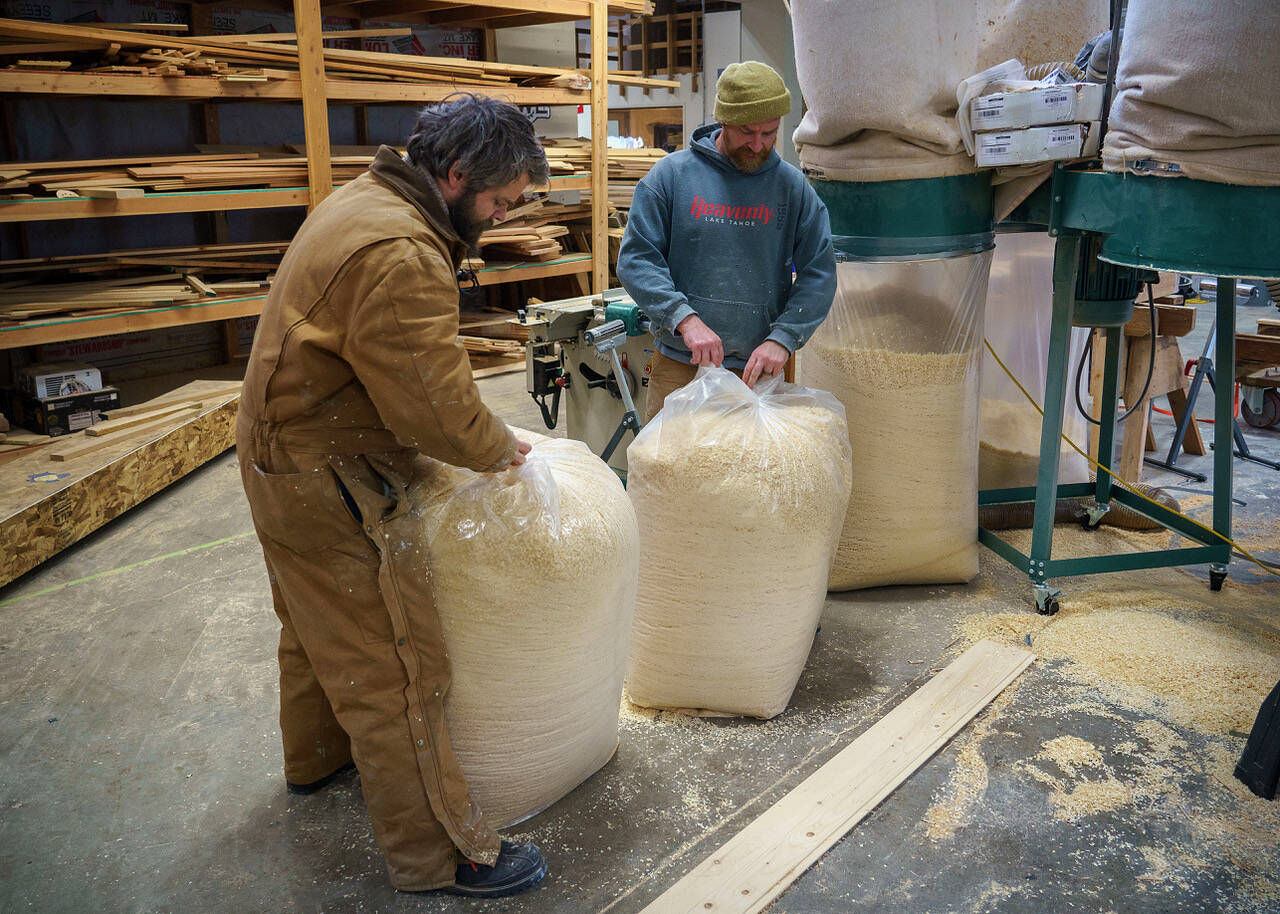For Bret and Maverick Christensen, wood is in the blood.
The father and son are the owners of Whidbey Millhouse, a wood shop in Freeland that sources quality lumber from sustainable family-owned mills around the Pacific Northwest and specializes in creating materials for projects around the home, whether it’s flooring, shiplap or a dining table made from your favorite backyard tree.
“We might have an order for 2,500 square feet. There won’t be a knot, a pitch pocket or an imperfection in the whole thing,” Bret said. “That’s what we do. That’s our baby.”
Working with lumber is a tradition that has long been in the family. Bret’s great-grandfather, Victor Anderson, invented a number of tools and equipment still used in the industry today, including a patching machine for plywood. His grandfather operated many mills and was also a neighbor to author Ken Kesey, whose 1964 novel “Sometimes a Great Notion” explores the complexities of a logging family in Oregon. Bret’s aunt, Margaret Elley Felt, was also a prolific writer who often wrote about the history of women in the logging industry.
Although he’s worked in mills and with wood throughout the years, Whidbey Millhouse is a relatively new chapter of Bret’s life. A friend started the business in 2016, but Bret took over in 2020 when he fell ill. Bret was soon joined by his son, who left behind a successful career to become his business partner.
“Maverick went out, sailed the seven seas and was really busy as a tugboat captain,” Bret said. “He was making good money and everything, but he’s an island kid and he didn’t like leaving the Shire.”
In 2021, the Christensens moved Whidbey Millhouse into a much larger, 12,000-square-foot space that’s about 10 times the size of the original building. Since then, they’ve been able to purchase bigger and better machinery to shape the wood.
“Where before we were maxing out at about, say, 2,000 lineal feet of material in a day, we can now do twice that much with this machine,” Maverick said of one of the newest additions.
The business has a special focus on using vertical grain wood from Douglas fir trees grown and cut exclusively in the Pacific Northwest.
“Even though Doug fir’s a soft wood – not a hard wood – it’s tough, and it’s really resilient,” Bret said.
Historic homes and buildings on Whidbey Island often contain Douglas fir flooring. If provided a sample, Whidbey Millhouse can match the original flooring.
“We had somebody come in with 150-year-old flooring, one piece, and it’s totally different than anything else we’ve run but our machine — and knowing how to use it — lets us totally recreate it,” Maverick said.
The business has worked with the Island County Historical Society to perform this service for historic homes in Coupeville, including the Haller House.
For those who are renovating or building a new house, Maverick acknowledged that it can be a challenge to sell people on more expensive, quality wood when cheaper alternatives exist.
“That’s kind of our big competition, is how do you get people to spend more money on our wood flooring that’s not perfectly engineered like the Lifeproof stuff that’s at Home Depot or Costco. That only is going to last 10 years or so,” he said. “But with a floor like this, yeah, it’s more expensive but it might last 100 years if you can keep up with sanding it.”
“All the stuff you’re buying – the luxury vinyl plank, the click-together, lifetime guaranteed – people get tired of it, and it just goes in the landfill,” Bret said. “This is timeless. That’ll look good forever.”
Whidbey Millhouse purchases lumber from mills that are Sustainable Forestry Initiative certified and involved in replanting trees. The exact type of wood used will run out someday as the oldest and biggest trees are depleted – likely within this lifetime – so the Christensens are proactive about using every last bit of this finite resource.
“At the end of the day, trees are still being taken down,” Bret said. “I just want to make use of them and make things that last so it’s not just getting ground up and thrown away. We try to make something beautiful.”
Pieces of wood that have imperfections – such as a misprint – are stacked up in the shop and used for other projects, like a charcuterie board or a garden shed.
Even the sawdust doesn’t go to waste. Every half hour, workers unload four 55-gallon bags of sawdust and sell them at a steeply discounted rate of $4 each, which keeps many animals and humans happy on Whidbey.
“It builds up that quick,” Bret said of the sawdust. “We’d be buried in chips in a day, easily.”
He’s looking to purchase a new machine for the business that will compress sawdust into logs that can be used as firewood.
Whidbey Millhouse is also unique for producing up to 24-foot long boards, which Bret said few others do in the industry.
People living on Whidbey are eligible for a special service. Maverick operates a mobile sawmill that can be driven to houses around the island to cut up trees. Customers can keep the lumber, or the raw materials can be brought back to Whidbey Millhouse and turned into a special project.
“Maybe they wanted a table made out of a tree that came down, or they had to take it down for some reason but it broke their heart — that’s where I really like to do it, because then it’s something sentimental from the property in their house,” Bret said.
In addition, Whidbey Millhouse recently acquired a door department from another business. “Door guru” Rick Cavanagh shapes slabs into all sorts of doors.
For more information about the business, visit whidbeymillhouse.com.



